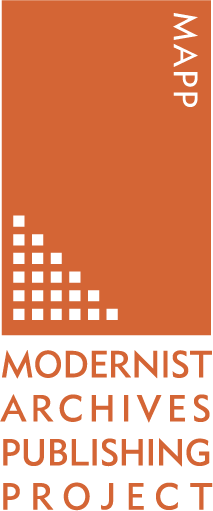Charles Davies
Biography
Authored By: Gareth Mills
Edited By: Nicola Wilson
Charles Davies was a Welsh-born writer, poet, and lecturer. He was born in 1901 in Penclawdd, Glamorganshire. He began his studies at the University College, Aberystwyth. In October of 1924, Davies was admitted to Jesus College in Oxford where he pursued his Master’s degree in Education which he completed with distinction in June of 1925 (Jesus College Oxford Archives RE.AD.6, leaf 99). After graduating, Davies was appointed probationary assistant lecturer in English at University College, Bangor on June 23, 1926.
Charles Davies’ novella, Welshman’s Way, appeared at the Hogarth Press in 1927, a year after his professorship started. At this time, the Woolfs were publishing the works of working class authors, including John Hampson, Huw Menai and R.M.Fox (Southworth (2012), 218). The Woolfs printed one thousand copies of Davies’ book in cream paper wrappers in brown and green (Woolmer, 46). According to the David H. Porter’s Omega Workshops and the Hogarth Press, Davies’ novel was intended to be one of a series of Hogarth Press stories, “but poor early sales led the Woolfs to limit the series” to just two books, the first being The Empire Builder by Lord Olivier. In a letter of February 1927 to Davies, Leonard Woolf predicted poor sales, but acknowledged his own and Virginia Woolf’s appreciation of Davies' work nonetheless: “We have been extremely interested by your MS and think it in many ways a remarkable piece of writing. It is hardly likely to have a large sale, but we should much like to publish it,” (HPA, 1927).
Between 1928 and 1948, Davies continued to serve as a lecturer for University College, Bangor. At the same time, he continued publishing, editing, and reviewing multiple books and essays. In 1928 and 1929, he edited D.G. Rossetti’s “Selections” and two articles, “On Being an Essayist” and “A Glimpse of Mr. Chesterton,” appeared in The Bermondsey Book (Ann Hughes, University College Bangor Archives). On December 9, 1931 Davies was promoted from his probationary position at Bangor to a lecturer of English. A year after this, in 1932, he published a collection of poetry titled Cold Comfort with Noel Douglas publishers in London. This collection is dedicated simply “To Con.” Con is Constance Bullock-Davies, his wife and fellow lecturer at Bangor in Classics and Modern Languages (http://www.archiveswales.org.uk/).
Bullock-Davies was a lecturer in in the Department of Education between 1953 and 1969. She was one of the foremost researchers on King Arthur. She was also a prolific writer; some of her works include English pronunciation from the fifteenth to the eighteenth century: a handbook to the study of historical grammar (1935), A grain of mustard seed: an account of the founding of the first Women's Institute in Great Britain, with extracts from its minute books (1953), Professional interpreters and the Matter of Britain: a lecture delivered at a colloquium of the Departments of Welsh in the University of Wales at Gregynog, 26th June, 1965 (1966), Menestrellorum multitudo: minstrels at a royal feast (1978), and Register of royal and baronial domestic minstrels 1272-1327 (1986).
In the 1930s and ‘40s, Davies continued to contribute to and to publish in works such as “The Rape of the Lock and Evelyn’s Mundus Muliebris – a Parallel” (July, 1934) and the Poetry Chronicle in Wales (May, 1948). Another notable contribution during 1945 was Davies’ review of T.S. Eliot’s Four Quarter’s in the journal Wales (Vol, IV no. 6) perhaps born of their earlier correspondence in 1928 (The Letters of T. S. Eliot Volume 4: 1928-1929). By this time, Davies had been promoted yet again at the University College, Bangor to senior lecturer on September 24, 1947. Judging by the correspondence during the ‘30s and ‘40s between Davies and writers like Edwin Muir and W.H Davies, as well as publishers like Jonathan Cape, it seems Davies was actively involved in not only producing his own work, but helping others produce and become published as well.
Davies continued his professorship at Bangor until his death in the summer of 1953. A newspaper article about his death from the archives at University College, Bangor reads: “A cloud was cast over the department in the summer term by the illness and sudden and untimely death of Mr. Charles Davies” (U.C.N.W. Reports of the Heads of Departments for 1951-52 and 1952-53). The high regard for his work and professorship are apparent in this document.
